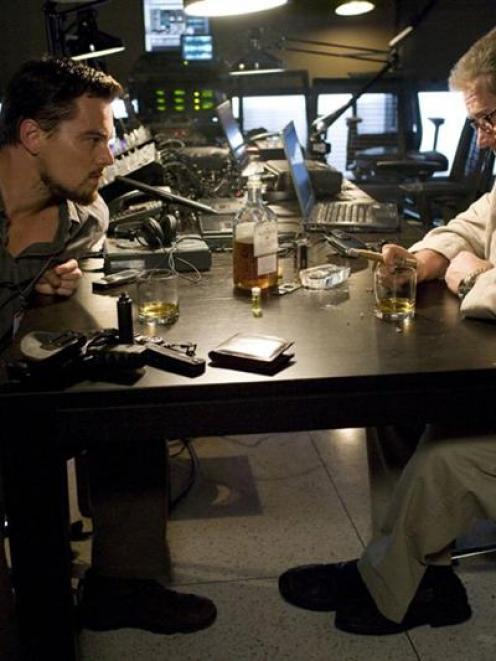
"I was constantly fuelled with adrenaline," DiCaprio remembers of filming his new espionage thriller, Body of Lies.
"There were certainly moments of sheer anxiety."
He wasn't talking about the physical hardships he endured for director Ridley Scott's homage to such '70s political potboilers as The Parallax View and Three Days of the Condor, although the 33-year-old Los Angeles native did endure plenty.
DiCaprio's character, undercover CIA operative Roger Ferris, is treated like a human pinata.
He narrowly outruns terrorist bombs, is torn up by shrapnel in a helicopter missile strike and attacked by a rabid dog while on a covert mission to take down a Middle Eastern terrorist cell.
In addition, Ferris must navigate the treacherous shoals of his own government's convoluted agenda in the region, his progress undercut at every step by a ruthless agency station chief, played by Russell Crowe.
Worse, in actuality, DiCaprio was stricken by a respiratory illness after filming a harrowing, emotionally exhausting torture sequence in an ancient Moroccan prison - the actor's latest movie war wound; he sustained a minor knee injury while filming 2006's Blood Diamond in Mozambique.
"If you're going to put something like that on film, we all had an understanding that it had to be as realistic and frightening as it could possibly be," DiCaprio said of the torture scene.
Based on Washington Post political columnist David Ignatius' novel of the same name, Body of Lies makes the harshest appraisal of American foreign policy of any big-budget studio film produced during the second Bush administration.
The movie posits that the United States has lost its direction in the Middle East, portraying frontline operatives as working without strategy or the necessary willingness to co-operate with foreign governments to achieve peace.
"We're waging war in a place we don't entirely understand," said DiCaprio, who consulted a former head of the CIA in preparation for the role.
But what really put the actor outside his comfort zone on Body of Lies was the unique professional mojo between Scott and Crowe - a hard-charging duo who take a perverse pride in skipping any conventional rehearsal process and who would excise huge chunks of the script just moments before the cameras rolled.
For DiCaprio, thrice Oscar-nominated and something of a muse to Martin Scorsese (after starring in the director's Gangs of New York and The Departed as well as the upcoming Shutter Island), it wasn't easy being the odd man out.
And those kinds of challenges to his normal process triggered a fight-or-flight response.
"You hear it a lot in this business, that there's a 'shorthand' between an actor and a director," DiCaprio explained.
"But Russell and Ridley were really accustomed to working together. It took me a few weeks to get used to that work process and into that pacing.
"It's just a few words then, 'Boom! Boom! Boom! Let's take that whole sequence out. You got it? All right. You agree? Great. We're going to shoot it in 10 minutes'."
With characteristic movie-star magnanimity - a kind of default setting of celeb-speak that puts a positive gloss on negative experiences, verging close, at times, to damnation by faint praise - he added: "I learned a lot from that."
Scott and Crowe mark their fourth movie pairing with Body of Lies.
It's a road-tested relationship responsible for the best picture Oscar-winning Gladiator (2000) and the 2007 box-office smash American Gangster (as well as 2006's schmaltzy romantic-comedy A Good Year).
The director justifies his methodology by pointing out that a table reading is usually enough to give the actors their "motivation".
And that the shoot-now-ask-questions-later modus operandi that he and Crowe have perfected allows interactions to be "a more visceral thing" in the director's view.












